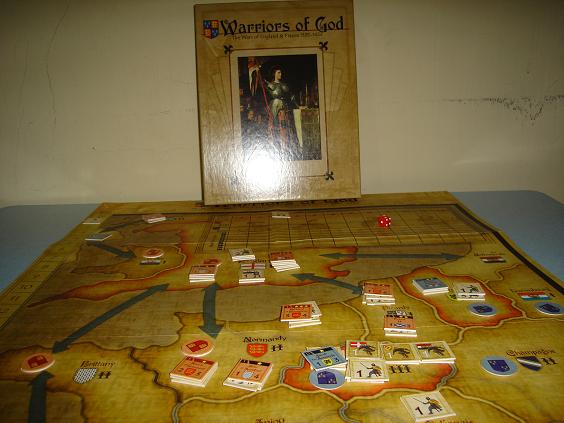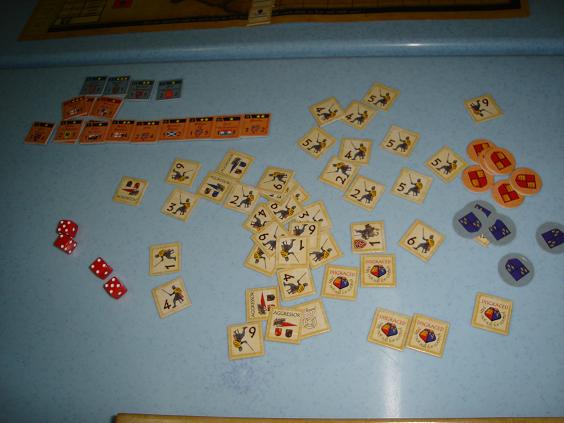
I keep playing so many new boardgames that I’m beginning to build up quite a backlog of posts about them. Anyway, Warriors of God is another one of Han’s games. He lent this one to us to take home so my wife and I played around with it for about a week. Even so, we only managed to play the Hundred Wars scenario once and skipped the Lion in Winter scenario entirely, so my impressions here aren’t exactly based on a whole lot of experience with the game.
This is technically the first wargame I’ve played so far and while I’ve been dreading the complex mechanics wargames are traditionally known for, Warriors of God doesn’t feel very heavy-weight to me at all. As the names of the scenarios imply, this is a two-player game that covers the intermittent wars between England and France in the medieval era. It does come with just a flimsy paper map and a whole lot of counters. I think that’s all part of the wargame tradition.
Most of the game’s rules are pretty straightforward and intuitive, especially for someone with some background in computer-based strategy games. One outlier is that rolling for initiative at the beginning of each round also determines how many actions each player has during that turn. The winning player not only gets to act first but also gets one extra action. It’s a pretty huge advantage but it’s also mitigated by other factors that I’ll go into later.
The actual actions you can do are all quite simple. They basically amount to different variations of moving armies around on the map or using superior numbers to remove one your opponent’s Control Markers in a province. One important rule is called the flypaper rule which prevents the side that has less leaders in a province than the other from moving away. It’s a small rule, but one that has a lot of strategic implications. Combat only occurs at the end of each round after all actions have been spent.

Warriors of God uses a zero sum game approach to its Victory Points system, meaning that only one player can ever have positive points. If the other player earns points, it first goes towards reducing the opponent’s points to zero with the excess going into positive points. These points are mainly earned by controlling the provinces on the map, but a fair proportion can also come from killing your opponent’s leaders in battle or imprisoning them after you capture them.
These leaders are really the core of the game and what sets it apart. For starters, all troops must travel with a leader. Any troops not assigned to a leader simply melt away. Secondly, new leaders appear in the game on a fixed schedule. Every turn, six new leaders are guaranteed to appear. Two are English, two are French and two are neutrals that can go to either side. This is where the player who lost the initiative roll gets his revenge as he gets to pick which of the two neutrals joins his side while the remaining one automatically joins his opponent.
The leaders are such a key component that the main difference between the two scenarios is that each one has a separate set of leaders to use. The leaders have all sorts of gameplay statistics that are printed directly on their counter. I found all the numbers and symbols quite confusing at first but once you’re a few turns in, you learn to internalize all the information and you can tell at a glance which leaders are good for what.
The kicker with them however is that leaders can die rather unpredictably and not from battle either. The leaders of the losing side in battles are actually likelier to be captured or to simply flee rather than be killed. Most leaders die of plain old age and this is simulated by a rolling a die at the end of the turn for every leader on the map. The older the leader is, the likelier he’ll die but time is guaranteed to catch up with everyone eventually. If you read the BGG forums, this is a huge source of frustration for many players.
For our game, my wife opted to play England while I settled down for a beating as France. This is because England gets longbows. To conduct combat, you get to roll dice equal to the combat skill of your battlefield commander or the troop strength in that province, whichever is lower. Usually skill is the limiting factor as it’s quite easy to raise lots of grunt infantry. Longbow troops have the special advantage that they effectively count as double combat strength, meaning that the English player will usually be able to roll two dice for every archer.
This meant that I pretty much had to play defensively for the whole game. France’s advantage is that it has a deep interior to retreat into, plus its leaders can automatically gain control of many of these interior provinces. Normally, if you try to use a leader who’s not in his home region to gain control of a province, you need to roll a die and get a result equal to the leader’s rank or less. Since the highest ranking is three and only kings have that rank, this is a very unreliable method. So I duly conceded the coastal areas to England, looked at the home regions of my leaders who will be popping up soon and headed there.
A couple of times I used the flypaper rule to tie down the English armies. This meant sacrificing weak leaders to prevent the English from getting to the leaders who are really valuable to me and hope that they manage to run away safely. The French do a lot of running away in this game. When in provinces that a player controls, he may opt to offer siege to the enemy rather than battle in the open. I find that this mainly benefits the defensive-minded French as it negates the English’s longbowmen and allows even a small force a good chance of defending a territory. Numbers become irrelevant in sieges. Only gunners who specialize in siegecraft, the value of the territory and the individual bravery ratings of the commanders of both sides matter.
My wife’s mistake was that she didn’t capitalize on England’s strengths and didn’t act aggressively enough. She kept waiting until she either had overwhelming force or strong force capable of breaching a castle’s defenses before she would attack. She should have attacked more often regardless of whether or not her forces could siege effectively as the attackers lose nothing from a failed siege while the defenders lose everything. This allowed me to collect points turn after turn while she gathered her forces.
I had extremely bad luck with the leader death rolls however. There was one turn where half of my leaders on the map died of old age all at once, which was a devastating blow. I think I had to play more than half the game without a French king as they kept dying. The one time I did have a king, he was an incompetent idiot with a battle skill of only one. Due to his high rank, I had to use him as my battle commander even though I had more skilled but lower ranked leaders in the area. On the other hand, if England managed to get its hands on him, it would be worth a lot of points. Thinking my way out of that was a real headache.
Still, I managed to keep a lead in points throughout the game and then out came Joan of Arc. She’s basically a super-awesome battle commander who can easily win any battle so long as the commander on the side isn’t very brave, and most aren’t. I used her to trounce a moderately sized English army on the turn she appeared and after that, my wife conceded. At that point, while it might have been possible for her to whittle down my lead eventually, she probably wouldn’t be able to win especially since I could use Joan of Arc to threaten her armies.
I realize that my experience with this game is too brief for me to come to any meaningful conclusion and it would be fair to say that games like this aren’t my wife’s strong point. Still, I’ve ended up a pretty favourable view of this game. I particularly like how it uses a relatively small set of rules that combined with the cleverly designed sequence of leaders that show up, nevertheless successfully recreates some of the historical situations from the era.
The leader death mechanic seems random and chaotic, but it’s in keeping with the spirit of the age and I’d guess that good players should be able to expect which leaders are about to die and plan accordingly. It also helps to keep things lively and staves off the temptation of over-analyzing things since all your plans must inevitably be reassessed after the death phase. Overall, a very neat game, but I do wonder how often people have the time to play this as I think it could easily take four hours and it’s only a two-player game.
2 Responses to “Warriors of God”
Another advantage for non-initiative player is he can get extra neutral leaders from those routed from battle or ransomed from capture (especially when there are odd numbers leaders). He will also get unassigned troops first (which is huge advantage)
I think French without king is actually good; no target and less action for the English (the -1 initiative roll).
When you are familiar, games usually take 2-3 hours.
I don’t mind the random leader death, like you said, death eventually caught up with everyone.
Your wife shouldn’t give up, i have played 2 games so far where Joan of Arc died the nect turn she appeared during Leader Death. 🙂
I don’t think we ever ransomed anyone, just let them rot in jail. Heh.
Good point about the French preferring less actions. I think we had very few actions per round for most of the game.
Even though my wife generally doesn’t like games with fighting in it, she thinks that the design for this is pretty neat.
And I like that they used the French spelling for the appopriate names. Joan of Arc sounds so ugly when you’re used to Jeanne d’Arc. Actually when I was in France and they first time someone mentioned “Jeanne d’Arc” to me I was confused because I always associated the person with the name “Joan of Arc”. Now it’s the opposite.
Leave a Reply